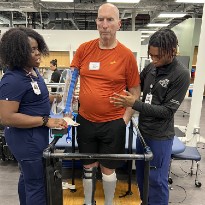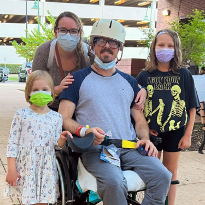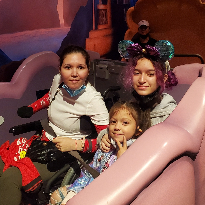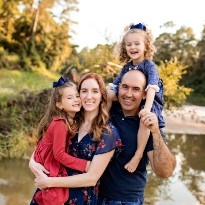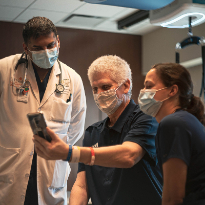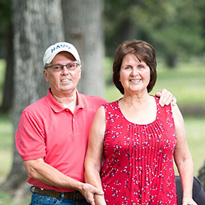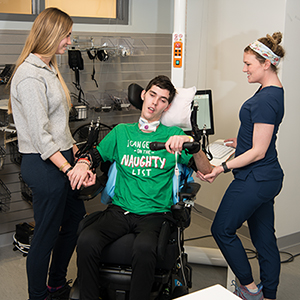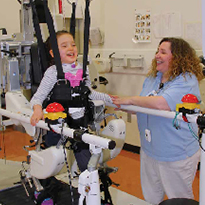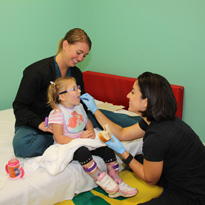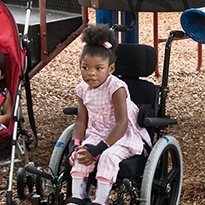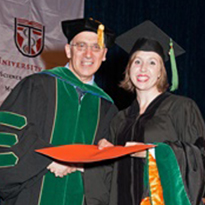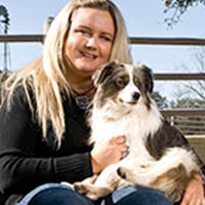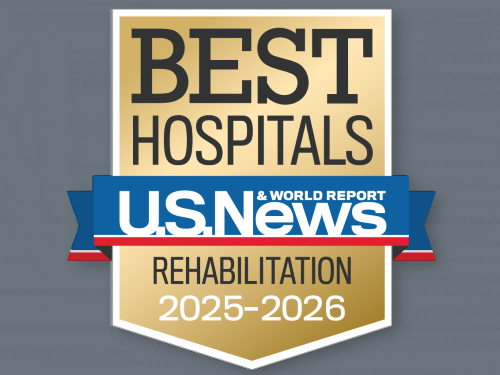A harmonized plan of treatment for each individual is developed by a team of doctors and specialists in order to ensure the best possible care and a return to independence.
Speech and Augmentative Communications
There are a wide range of treatments, techniques and technologies being used to enhance speech skills, including melodic intonation therapy, Visi-Pitch® and Bungalow software programs.
As appropriate, we work closely with each client to find alternative methods of communication. There are many different kinds of devices that meet different needs from the simple, non-electronic variety to the complex, computerized device. Devices may be controlled by a puff of air, a blink of an eye, typing on a keyboard, or a synthesized voice.
Swallowing Therapy
For those with swallowing problems, the department utilizes a number of special diagnostic tools, including non-invasive x-ray procedures, to help evaluate the nature and extent of the condition. Various electronic devices and computers, if appropriate, may also be used both in assessment and treatment.
Most swallowing problems can be diagnosed upon examination of speech, oral function and by observation of the swallowing mechanisms but sometimes it is necessary to confirm this by videofluoroscopy. This is a video x-ray to show exactly what is happening when food and drink of different consistencies is swallowed. From the results of the video swallow, appropriate treatment recommendations are made.
Vital Stim® Therapy
With the guidance of a speech pathologist, treatment may involve incorporating compensatory strategies when eating (including chin tuck, frequent swallows or checking mouth), altering food consistencies (including soft, pureed or chopped) and specialized eating/drinking equipment.
Lee Silverman Voice Treatment (LSVT)
LSVT is a proven effective treatment program that restores oral communication in individuals with Parkinson disease (PD) beyond what current pharmacological and surgical interventions can offer.
The development of LSVT was motivated by the recognition that the reduced ability to communicate is one of the most difficult aspects of PD. Soft voice, monotone, hoarse voice quality, and imprecise articulation, together with lessened facial expression, contribute to limitations in communication.
The LSVT approach centers on a very specific therapeutic target: increased vocal loudness. This key target acts as a trigger to increase effort and coordination across the speech production system.
Speech therapists also work to improve cognitive function, helping individuals with attention to tasks, memory, reasoning, problem solving, and executive functioning, such as goal setting, planning, initiating, self-awareness, self-monitoring and evaluation.
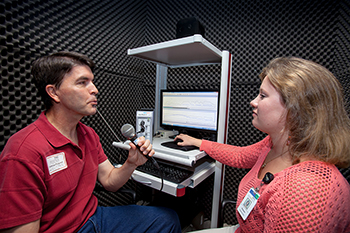 Individuals encountering problems with their communication, language and swallowing may benefit from the specialized attention of TIRR Memorial Hermann's Speech Therapy. Our certified speech therapists and language pathologists diagnose and treat a variety of disorders resulting from stroke, brain injury or other neurological conditions.
Individuals encountering problems with their communication, language and swallowing may benefit from the specialized attention of TIRR Memorial Hermann's Speech Therapy. Our certified speech therapists and language pathologists diagnose and treat a variety of disorders resulting from stroke, brain injury or other neurological conditions.